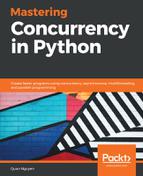Another way to think about sequentiality is the concept (in computer science) of a condition called I/O bound, in which the time it takes to complete a computation is mainly determined by the time spent waiting for input/output (I/O) operations to be completed. This condition arises when the rate at which data is requested is slower than the rate at which it is consumed, or, in short, more time is spent requesting data than processing it.
In an I/O bound state, the CPU must stall its operation, waiting for data to be processed. This means that, even if the CPU gets faster at processing data, processes tend to not increase in speed in proportion to the increased CPU speed, since they get more I/O-bound. With faster computation speed being the primary goal of new computer and processor designs, I/O bound states are becoming undesirable, yet more and more common, in programs.
As you have seen, there are a number of situations in which the application of concurrent programming results in decreased processing speed, and they should thus be avoided. It is therefore important for us to not see concurrency as a golden ticket that can produce unconditionally better execution times, and to understand the differences between the structures of programs that benefit from concurrency and programs that do not.
